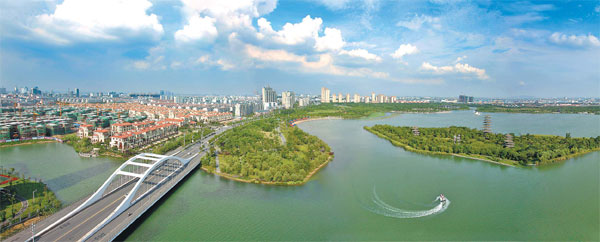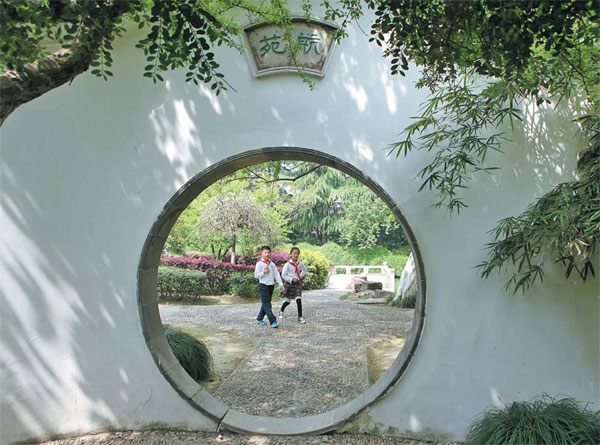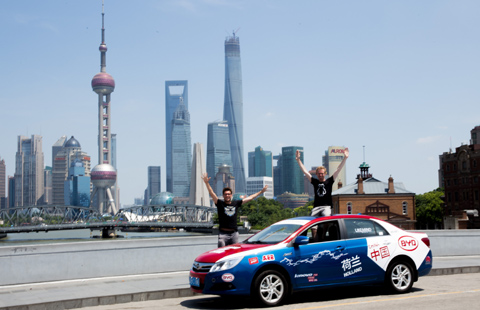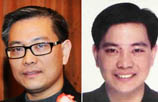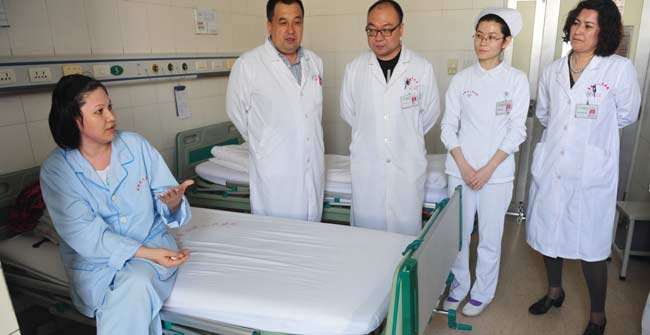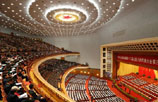'Green' city attracts new residents
By Jake Hooson (China Daily) Updated: 2015-04-27 07:50Harmonious society, friendly people draw professionals to Zhangjiagang in East China, Jake Hooson reports.
Famous for its many green spaces and parks, Zhangjiagang in East China's Jiangsu province was chosen as a pilot city to develop its environment.
Authorities in the city have re-energized areas that were previously neglected, planted thousands of trees and implemented a number of programs to create a harmonious society.
The city's economy has undergone a boom in recent years, taking its population up to around 0.92 million, and its comprehensive strength ranks in the top three of county-level cities around the country.
Since the city's establishment as a "unique model city of the nation" in 1996, modernization has taken place, paving the way for a number of malls, recreational facilities and high-class establishments. Thanks to rules and guidelines implemented to encourage mutual respect, visitors to Zhangjiagang have commented on the beauty, friendliness and cleanliness of the city compared to others in China.
As foreign investment has poured in over the years, the city has become an increasingly attractive place for foreign businesspeople and experts to live, thanks to its obvious economic and geographical benefits but also for its slower pace of life and the clean environment.
One such foreigner in the city is George Kastner. He was born in Romania to Jewish parents before moving to Israel and then on to the United States, where he has worked as a distinguished academic. Fluent in four languages, Kastner has worked as an international strategy and operations consultant in 22 countries in the Middle East, Latin American, North America, Europe and Asia.
His consultancy work as CEO of First GTK Growth Tactics has now brought him to Zhangjiagang, where he advises Jiangsu Guotai International Group - a production trading company and the first large industrialized corporation established in the city.
A resident of Zhangjiagang for one and a half years, Kastner is full of praise for the city, especially its environment.
"Young couples like to live here because it is a very safe place. The environment is also one of the best in the province; 95 percent of the year, the air is fine. It used to be referred to as the garden city for its many parks," he said.
'Spirit of the city'
In addition to the city's pleasant environment, its integrity and work ethic have impressed Kastner the most, who said there is a distinct "spirit of the city" among residents.
"People here are dedicated and hardworking. They're like sponges; they absorb so much information and are very willing to learn," he said.
The rapid development of the city's industrialization over the last few decades has altered its demographics. Home to a number of successful manufacturing, chemical and textile companies, the city now nurtures the super rich, as well as wealthy individuals engaged in middle management positions or owners of small and medium-sized enterprises.
But despite having an economic wealth gap that has damaged the fabric of society in many countries, the residents of Zhangjiagang share the same spirit, Kastner said.
"You do see people getting rich. You see relatively little envy compared to other places. People realize you have to work if you want to succeed at something," he said.
Asked how the city's residents had fared following the central government's recent crackdown on corruption, Kastner said that like many other similarly sized cities in China, it has had an effect.
"The largest KTV in the city shut down. I think partly because of the government crackdown on excessive spending, but also partly because that generation has grown up and the younger generation is interested in other things," he said. "The people just adapt. They learn, they adjust and they adapt - that's the spirit of the city."
Zhangjiagang falls in the jurisdiction of Suzhou and, despite being smaller than other cities in the province, "has a certain say in provincial policies," such is the economic importance of the city, Kastner said.
"The city is close enough to Shanghai, the highway is new, comfortable and safe, and it's close enough to tourism cities such as Suzhou and Nanjing. It is growing around its capacity to generate an active economy. I expect to see a larger contingent of foreigners here and I expect to see an improvement of universities here. I also expect the hospitals here to improve and for clinics to have doctors specifically assigned to foreigners," Kastner said.
Positive changes
Another foreigner who has noticed positive changes in the city is Paul Zanetti, a Frenchman who now works as an internal training consultant for a number of firms in the city, including Solvay, a world-leading Belgian chemical company.
Upon graduating with a degree in economics and management, Zanetti moved to China to teach English and wound up living in Shenyang, Liaoning province.
After a short stint in the country, Zanetti moved back to France, where he lived and worked in Paris for a few years. But he soon noticed a difference in working environments between the two countries, and felt there were more opportunities in China for people prepared to work hard.
"I didn't like the life in Paris. I just couldn't see myself doing well there in 20 years," he said.
When he heard of a job opening in Zhangjiagang from his father, Zanetti entertained the thought once again of returning to China to work, and, after sending his resume, landed the job.
"Since I used to live in Shenyang, my first impression of Zhangjiagang was how clean it was," Zanetti said. "It has a very peaceful town feeling here; that's something that I like. I drive to work every day and there are traffic jams, but you only have to wait for a few minutes. Living in Paris, I used to yell when I was driving and now I don't have that anger. It's great to be able to go home and already feel relaxed," he added.
"People are quite nice here and it has that community feel."
One change that Zanetti has noticed in his job is the standard of education of new professionals coming to the city. "In the chemical companies here, the level of education has risen quite a lot. Now, the minimum requirement for an engineering job is either a comprehensive engineering background or a master's degree," he said.
It is this change in education standards that Zanetti's wife, Tang Yan, - a local of Zhangjiagang he met at his workplace - believes is bringing fresh perspectives to the city.
"More people are coming into the city from outside and bringing a different mindset," said Tang, who herself studied in Australia for several years. "Traditionally, the locals were not very open-minded here and many rarely left the province, but people coming from different places are slowly changing that."
Temporary residents
Like nearby Shanghai, Zhangjiagang is very much a city of temporary residents. Many of the foreigners that work there visit regularly throughout the year for a few weeks at a time.
As part of Kastner's role at Guotai, he oversees operations at the Guomao hotel, the city's premier hotel destination for domestic and foreign businesspeople alike. "Sometimes it feels like I'm the only foreigner in the hotel," he said. "But other times, the place is full of expats. I think as the city develops, foreign workers will become more of a permanent fixture."
The lack of foreign-owned restaurants and entertainment venues might not give the city the same allure as nearby Nanjing or Wuxi, but Kastner expects this to balance out as the city continues to develop economically.
The saying, "If you build it, they will come," rings true in the case of Zhangjiagang, according to Kastner.
"The city has to promote itself on its natural characteristics. The climate here is very comfortable, especially for young couples," he said.
To compete with nearby cities in attracting talent, Kastner believes that the implementation of temporary preferential policies - such as the "buddy system" he established in Venezuela and Russia, which helped pair newcomers to the city with locals - would be beneficial.
"People are more private in China, whereas in the West, people have more of an open-house mindset. Having programs such as a buddy system and financial incentives to move here would help," he said.
The city's efforts to develop its green environment have paid dividends for young couples such as Zanetti and Tang in fostering a desire to reside in the city.
"We live in the west side of the city ,which is a new area. There's a river there, which used to be very deserted. But now it's really a beautiful place. You can see the birds coming back to the area," Zanetti said.
Over 6 million tourists visit Zhangjiagang every year, drawn by the clean environment and polite and friendly residents. Famous for its many green spaces and parks, Zhangjiagang was chosen as one of the first pilot cities in 1994 to develop its environment.
"Something I've noticed is that people enjoy going out for a walk in the evenings after dinner," Zanetti said.
The city still has a long way to go in developing its infrastructure, regulating its industries and creating amenities that cater for a Western audience, but Kastner said he hopes he can continue coming to the city regularly for the next five years.
"I'm excited to see young people coming into the city and bringing fresh ideas and a global awareness," he said.


|
Famous for its many green spaces and parks, Zhangjiagang was chosen as one of the first pilot cities in 1994 to develop its environment. Photos provided to China Daily |
|
The Shazhou Park, featuring the elegant, classical gardening art, offers an ideal place for locals to relax. Shi Xiaojiao / For China Daily |
(China Daily 04/27/2015 page6)
- China's cyberspace 'vulnerability' exposed by attack
- Three nations drafting an action plan to fight pollution
- China to control sex ratio of newborns
- The new king of the swingers
- China's migrant workforce ages, sparking economists' concerns
- Chinese scientists discover 'batman dinosaur'
- Vancouver property developer identified
as Chinese fugitive: report - Three villagers killed close to
DPRK border - Police hunt kidnappers who
fled with $3.6m - Beijing college students are never too busy to go online
